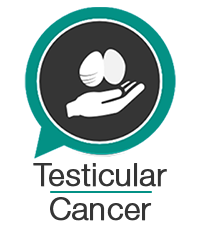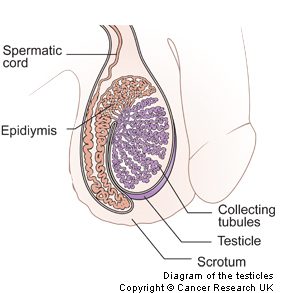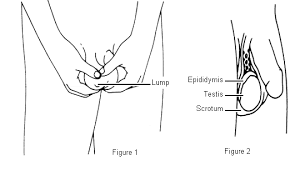 Testicular cancer is cancer that develops in the testicles, which are part of a man’s reproductive system
Testicular cancer is cancer that develops in the testicles, which are part of a man’s reproductive system
- What you should know
- Risks and causes of testicular cancer
- What to look out for
- How to check yourself
- What is the treatment for testicular cancer
Testicular cancer: What you should know
• Testicular cancer is a relatively rare disease.
• However, it is the most common cancer found in young men aged between 15 and 34 years.
• Every year about 164 men are diagnosed with testicular cancer in Ireland.
• This number has been growing over the past few years so it is important to check your testicles on a regular basis.
• Testicular cancer is very treatable – more than 97% of men with testicular cancer are cured.
The testicle and testicular cancer

Caption: Diagram of the testicles
Taken from the patient information website of Cancer Research UK: http://www.cancerresearchuk.org/cancerhelp
The testicles are the male reproductive organs contained within a bag of skin called the scrotum, which hangs below the penis. The testicles produce sperm. Testicular cancer is a growth or tumour, which appears in one of the testicles (which are commonly known as ‘balls’).
Risks and causes of testicular cancer
• Being a man.
• Being born with un-descended or partly descended testicles.
• Having a family member, father or brother who has developed the disease.
• Being a male with a fertility problem.
What to look out for
Cancers which are found early are the most easily treated. It makes sense to know how your body normally looks and feels and this includes your testicles. This will make it easier for you to notice any changes. A swelling or lump in one of your testicles which is not usually painful is the most common sign of testicular cancer, however there are other signs to look out for:
• Small lumps or hardness on the front or side of a testis.
• Swelling or enlargement of the testis.
• An increase in firmness of the testicle.
• A sensation of dragging or heaviness in the scrotum.
• A dull ache in the lower abdomen or groin.
It is important to note that most lumps are benign (harmless) but others may be cancerous and should be treated as quickly as possible. It is unusual to develop cancer in both testicles at the same time, so if you are wondering whether a testis is normal or not, you can compare it with the other.
How to check yourself
Often the best place to check yourself is in the bath or shower where the scrotum is relaxed and the testicles can be felt easily.

Caption: Checking your testicles
Taken from the patient information website of Cancer Research UK: http://www.cancerresearchuk.org/cancerhelp
• Hold your scrotum in both hands.
• Use your fingers and a thumb to examine your testicles.
• It is common for one testicle to be slightly larger than the other, so don’t be alarmed if this is the case. Gently feel each testicle, one at a time.
• You should be able to feel a soft tube at the top and back of both of them. This tube (epididymis) carries the sperm. It may be slightly tender but do not confuse this with an abnormal lump in the testicles.
If you notice any of the signs listed above, go to your GP immediately and they will be able to assess you and, if necessary, refer you to a consultant for further investigations. Do not be embarrassed or nervous. Remember early detection of the disease is your best chance of a cure.
How testicular cancer is diagnosed
Usually, you begin by seeing your GP who examines you and takes your medical details. Then, if they think it’s necessary, your GP refers you to a consultant for tests to see whether you have testicular cancer.
At the hospital, the doctor will examine you and ask questions about your health and your family’s health. They will ask you to have some blood tests and an ultrasound scan. They will test your blood as testicular cancers often produce hormones that can be measured in the blood. You may also have an ultrasound scan of both testicles and your scrotum. An ultrasound is a painless examination using sound waves. This can show if there is a solid lump, or a fluid filled cyst which is less likely to be a cancer.
How testicular cancer can affect sex life and fertility
Removing one testicle does not affect sex drive or the ability to have an erection provided the remaining testicle is normal. The loss of a testicle may embarrass a young man. For this reason a testicular prosthesis (false testicle) can be placed in the scrotum at the time of surgery to remove the cancerous one.
Fertility can be compromised by testicular cancer treatment. However the potential to father children should not be greatly affected provided the other is normal. Chemotherapy, however, does affect sperm production in this testicle. Because of this, it is now recommended that patients with testicular cancer arrange to freeze sperm so that if there are problems with fertility later on, this frozen sperm can be used to fertilize a partner’s egg and father a child.
What is the treatment for testicular cancer
• If the blood tests or ultrasound results show that you have cancer then the abnormal testicle is removed by surgery with a small incision in the groin.
• The patient is then scanned to see if the cancer has spread. Depending on the scans and the results of tests on the abnormal testicle, the patient may be advised to have;
– Radiotherapy: the use of radiation to kill cancer cells
– Chemotherapy: the use of drugs to kill cancer cells
For more information on Thrombosis which may occur during / after chemo click here
The results of modern treatment for testicular cancer are excellent even in those patients where the cancer has spread outside the testicle to other parts of the body.
For a leaflet about testicular cancer, please click here.
Donate to Marie Keating
We hope you found this information useful. The Marie Keating Foundation offers all of our services for free. Help support people at every step of a cancer journey by making a donation today.
DONATE
